Friday, June 09, 2006
Live BE Radio Saturday Night at 8pm EST

 Hey everybody! I am getting ready for another night of BE Radio, and looking for your input. Last week was a great week, with a lot of listeners and a ton of requests, but I know we can top it...can you help make it happen?
Hey everybody! I am getting ready for another night of BE Radio, and looking for your input. Last week was a great week, with a lot of listeners and a ton of requests, but I know we can top it...can you help make it happen?
Last week, most of the requests asked for more upbeat, dancy, partying type of music, so that is what I have queued up so far. Is that what you want to hear? Let me know! I will get on your requests, whether they be specific songs, groups, or just a general idea of where you would like the music to go. So let me hear it.
 Also, we had two dedications last week and read three headlines off of peoples blogs. If you have a headline or a dedication you would like read over the air, tell me here...I'll get it on for you, no problem! Plus, if you would like to host a contest, driving some traffic to your site and getting people to read at least one post on your blog, let me know, we are always looking for contest hosts.
Also, we had two dedications last week and read three headlines off of peoples blogs. If you have a headline or a dedication you would like read over the air, tell me here...I'll get it on for you, no problem! Plus, if you would like to host a contest, driving some traffic to your site and getting people to read at least one post on your blog, let me know, we are always looking for contest hosts.
The show is Saturday night, 8:00 pm est, and you can hear it on BE Radio. And while you're listening, join the ShoutBox Chatroom, where bloggers just like you are getting together, talking and partying to all the music I can dig up. This is your show, so make sure you're there to hear it!
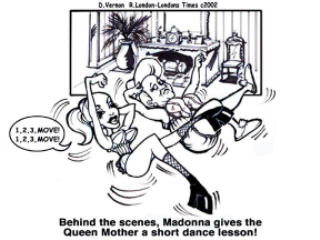
BlogExplosion Radio: Radio for Bloggers, by Bloggers and yes, even about Bloggers!
Read more-->
Posted by Scottage at 12:10 PM /
| |

Al-Zarqawi Taken Out! The Side Not Heard

I know, I’m slow today, I guess I’m the last person who will wind up posting on the military strike that killed Abu Musab al-Zarqawi. And originally, I was thinking I wouldn’t post on it at all, that everything that should be written would be written, and that there was no need to add an additional post to the nearly 8 Million posts on the killing.
But when reviewing a ton of these posts, I noticed that no one was examining how the Muslim world saw al-Zarqawi. For such an opinion, I turned to
Al Jazeera, who printed an obituary for the terrorist leader.
The
obituary was more accurate than you might think, describing al-Zarqawi’s rise from a small-time Jordanian criminal to a low-level radical Islamist, from his 1999 exile to Afghanistan where he linked with Osama bin Laden to his position as the leader or Islamist Tawhid and Jihad group in 2003, and finally to changing that group to a sect of al-Qaeda in 2004, operating out of Iraq.
The obituary does not make a martyr of al-Zarqawi, and saddles him with the responsibility for beheading two American hostages in 2004, the Hila bombing in 2005, and the 2005 bombing of a Jordanian Hotel. They site the bounty on his head, and his knack for the headline-grabbing attack, but there is no mention of virgins or revenge.
But the obituary also says that they believe al-Zarqawi’s role was exaggerated by the Western media and leadership.
But analysts believe that despite being a prominent figure in the Iraqi uprising, his influence was often exaggerated by the media.
His organisation was believed to be only 3,000 strong at most and US army officials admitted raising al-Zarqawi's profile by blaming attacks on his group, the Washington Post reported in April.
The one point not covered by the article is the revolutionary way al-Zarqawi
utilized the Internet as a weapon of terror. Al-Zarqawi was able to create disinformation, recruit new martyrs and soldiers, even coordinate attacks and provide support all through the net. Let’s face it, if the Bush administration is destroying our right to privacy with regards to internet communication, it’s at least partially because al-Zarqawi forced his had.
To me, whether or not al-Zarqawi’s role or importance is exaggerated, the world is a safer place without him in it. This does not provide justification for the war in Iraq, as al-Zarqawi only rose to prominence as a result of the Iraqi conflict. But al-Zarqawi was both evil and highly intelligent, a dangerous combination, and the Bush administration should be proud to have eliminated him. It’s a valuable accomplishment.
technorati tags: Zarqawi, Al-Zarqawi, Al Jazeera, Iraq, Al Qaeda, Bush Administration
Read more-->
Posted by Scottage at 3:38 AM /
| |

Thursday, June 08, 2006
Dowd, Friedman, The New York Times and a Brighter Tomorrow

Two excellent, and somewhat related, op ed pieces came out today that deserve some attention. The first, A Well of Smiths and Xias, by Thomas L. Friedman, is an optimistic piece about the diversity of US society, and the second piece, Damien, Demons and Dubya, by Maureen Dowd, who examines the use of the ban on gay marriage as a “boogeyman” to divert attention from the real issues of the country. Thanks to
David’s Ben Shuldiner for Congress site, which printed both pieces in their entirety.

I loved the Friedman piece. It chronicles his attendance of a high school graduation, and his surprise at the diversity of the graduating class. Friedman points to the US as still a beacon of hope for people all over the world, and the immigrants our society attracts as “our oil well – one that never runs dry”, indeed providing the US with its greatest resource: people.
But if there is one reason to still be optimistic about America it is represented by the stunning diversity of the Montgomery Blair class of 2006. America is still the world's greatest human magnet. We are not the only country that embraces diversity, but there is something about our free society and free market that still attracts people like no other. Our greatest asset is our ability to still cream off not only the first-round intellectual draft choices from around the world but the low-skilled-high-aspiring ones as well, and that is the main reason that I am not yet ready to cede the 21st century to China. Our Chinese will still beat their Chinese.
Of course I see other countries as embracing diversity as well, with some real shining examples in Europe, but the sentiment is right on target. This is why it is so essential to preserve our liberties, and uphold the constitution. The society we have created (and yes, we contribute to its creation on a daily basis) is the true draw of this country, it’s what makes us special, and attracts the flow of immigrants that compose American society.
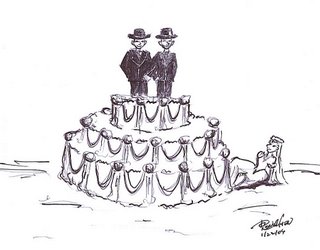
Maureen Dowd’s piece is much less optimistic, but equally important. Dowd looks at the various villains used by the Bush presidents, Sr. and Jr., to divert public attention from vital issues. And she points to Bush’s recent push for a ban on same-sex marriage as another example of this practice.
W. ignored the gay marriage issue in the 19 months after he used it to help him stay in the White House. To reprise it now, knowing it has no chance of passing, is so transparent that surely even the most blinkered ''values'' voters see through it.
She also points out that Bush may actually be showing signs of recognizing that he is only spouting rhetoric, and that he has become, if not the worst president in modern history, certainly they least effectual in this time of multiple crises.
Even as W. gave a speech here promoting a constitutional amendment designed to demonize and discriminate against a group of Americans who have done nothing wrong, his heart did not seem in it. A Democratic strategist noted on CNN that the president looked as cowed as ''a long-tailed cat in a room full of rocking chairs.''
Both pieces are eloquent and well written, and bring up points which deserve attention. But both come from the perspective that the world is, more or less, doomed, with Friedman showing one point of hope, and Dowd looking at the hiding of the problems. And certainly, the country faces many huge and seemingly insurmountable challenges today. But we also need to remember that there are many reasons for optimism.

Now I must say I’m as guilty (or more guilty) as the next guy for focusing on the difficulties we face and ignoring the promise, but this is predominantly because I believe that we can do things to prevent the worst from happening on these issues. I try to always keep in mind the wonderful things about the time we live in, and to try to look for the solutions behind these problems.
But there is tremendous reason for optimism. Advances in medicine have alleviated some of the worst diseases, and eased the suffering from some of the presently incurable diseases. Advances in communication have allowed people from so many societies to get to know each other, and about their societies, so that while governments may not get along citizens are beginning to understand each other.
The development of higher social consciousness emphasizes cases where people don’t enjoy freedoms. Many of the issues of war, hatred, genocide, discrimination, sexism, and more have been around for thousands of years, but only in the light of the evolving global morality do these issues become so pronounced.

We are at a crossroads today, and the crossroads are always tumultuous. But if we make the right choices, and stay along the path, the road ahead seems amazing. Now we need to put in the hard and smart work to achieve it.
technorati tags: Thomas L. Friedman, Maureen Dowd, A Well Of Smiths And Xias, Damien, Demons, And Dubya, Gay Marriage, Diversity, Optimism, New York Times
Read more-->
Posted by Scottage at 3:07 AM /
| |

Wednesday, June 07, 2006
Al Gore Chooses Global Warming over the Politics
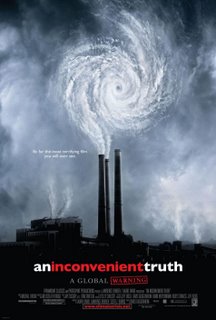
For weeks now I’ve been hearing Republicans claim that Al Gore’s movie on global warming, An Inconvenient Truth, is nothing more than a ploy to propel him into the spot light, and make him the Democratic front runner for 2008. I never believed it, seeing how passionately he spoke on the growing crisis of global warming and the need for change now.
Well, now I have more data to back up the altruism of Gore’s film. Gore began with a limited release of the film, only showing at first in 4 cities, and with no promotion besides the hype given the film by news industries throughout the country. Cities have been added, but not a single advertisement has been shown on TV or heard on the radio, and not even a poster for the film has been, well, posted.
But today, two days before the full release of the move,
a poster for the film was released…and Al Gore’s name is no where to be found. Not at the top of the poster, where we found Michael Moore’s name in Farenheit 9/11 posters. Not even in the credits at the bottom of the poster, which lists everyone involved with the flick. Even the
web site mentioned on the poster doesn’t list Gore on the front page, you have to drill down to find him.
When asked why Gore’s name appeared no where on the poster, a Paramount executive explained it as simply as possible: "It's not a political movie." To me, it’s like a breath of fresh air, a politician who cares more about his cause then the political juice he can gain from being associated with the cause. Hats off to Al Gore for keeping his eye on the ball. When An Inconvenient Truth opens in Rochester this Friday, I'll be watching.
technorati tags: Al Gore, An Inconvenient Truth, Global Warming, Movie, Release, Poster, Democrat, Republican, Paramount, Politics
Read more-->
Posted by Scottage at 12:29 PM /
| |

In Canada, Drug Smuggling a Marketable Skill
When reviewing who hit my site, I came across this hysterical post on the blog
dovate.com, and had to share it with you. Now I know Canada is more liberal than the US, but never could I imagine that a job seeker would list marijuana smuggling on their resume!

technorati tags: Marijuana, Job Search, Canada
Read more-->
Posted by Scottage at 12:00 PM /
| |

Tuesday, June 06, 2006
A Look Into the Future

I found this awesome picture on
Otilius' site, and it immediately got me thinking about the future.
The future is like a tunnel, where you can see a small part of what the future should hold for you. If you're like me, the future is very much like the baseball field, sunny, bright, and beautiful.
But the tunnel is dark, and you don't know what's going to be coming at you from either side of the tunnel. There could be things on the floor to trip you up or something hanging down to snare you. There may be doors on the side that lead to other tunnels.
And for this reason, you can't see the full picture of the future, only one small glimpse. Who knows if the image you see will even be the future you find, the future you call your own. But the image your moving to will determine how you handle the tunnel, and what you find at the other end of it.
Anyway, these are the thoughts elicited by this photo upon my first look at it. What do you when you look through the tunnel? Remember, the future is what you make of it.
ContestI have a new renter,
MsCatEyes! Cat has an excellent site, and is well worth a read. Cat had a visitor this past weekend. Name her visitor here in my comments section, and I'll give you 50 credits!
Read more-->
Posted by Scottage at 12:32 AM /
| |

Monday, June 05, 2006
Alternative Views on Frank Rich's "Supporting Our Troops Over A Cliff"

In the Sunday New York Times, columnist Frank Rich wrote a piece called
Supporting Our Troops Over A Cliff, and if you haven’t read it yet, give it a shot, it’s well worth a read. In the Op Ed, Rich points out that while the Bush administration may not be carrying out a successful campaign in Iraq, they have shown true talent in their rhetoric campaign, and I agree with his sentiments while disagreeing with many of his points.
Rich compares the two campaigns, that being the campaign in Iraq and the campaign for public acceptance of the Bush administration, and the author is correct that we’re doing a whole lot better in the second campaign then we are in the first, more important campaign. And the victims are our young men and women serving as soldiers in the war in Iraq.
I, like the author, am a huge supporter of our troops, but not a fan of the war. I see the dangers of disturbing greatly the fragile balance that has kept the Middle East in check for so many years. I worry about participation in a war where we have no exit strategy, and where, as in Beirut 23 years ago, we have become “just one more militia lost in the anarchy”, as commented by Nir Rosen in the Washington Post last week.
Rich points to the policy of “As the Iraqis stand up, we stand down” as clearly not working. He notes that many more Iraqis, some 263,000, are now standing up, yet we are sending more troops to Iraq all the time. The sentiment is right, but I believe the numbers are wrong, that we have fewer troops in Iraq today than we did a year. But the truth still remains that Iraqi troop deployments are not being offset by US troop removals.
Rich and I also view the situation in Tal Afar as a time where the government pushed the media to portray a set image that would inspire support for the war. As you can see, Rich sees Tal Afar as a disaster covered up:
There was another plan for victory, too, you may recall. On the third anniversary of the invasion, in March, the president celebrated the new strategy of "clear, hold and build" by citing the example of Tal Afar, "today a free city that gives reason for hope for a free Iraq." Last month 17 people were killed by a suicide bomber in an outdoor market there. The Tal Afar mayor has told The Los Angeles Times it will be at least three years before Iraqi security forces can secure his city of 150,000 without American help.
I agree that Tal Afar was spouted as a successful project city, and that the US has not necessarily reported on the city as they are embarrassed by the terrorist attacks there. But terrorism was much worse in Tal Afar, with consecutive daily attacks before this plan took effect, and I believe what we’ve done there to date is an example of positive steps by the US. We need to report it accurately, yes, but to learn from it, not to shame the Bush administration.
In general, I have a different view of the events than Mr. Rich, perhaps it’s the perspectives of a Nomad shining through, as my Middle Eastern history tells me that the most successful projects are the first attacked as resistance to change attempts to threaten these projects particularly.
But while Mr. Rich and I may come to different views on specific incidents, we come to the same conclusion: that by trying to divert the public’s attention or misrepresent the facts of the war, the Bush administration is doing a disservice to our men and women in uniform in Iraq. And that is indeed a tragedy.
technorati tags: Frank Rich, Iraq, Supporting Our Troops Over A Cliff, New York Times, Tal Afar, Middle East
Read more-->
Posted by Scottage at 4:49 PM /
| |

The Gas Price Rollercoaster and a Creative Solution to the Oil Crisis

In April and early May gas prices rose sharply, and the country was up in arms about the change in the average citizen’s real salary and the gross profits achieved by the Big 5 oil companies. On May 5th, a barrel of oil peaked at $75, the end of a sharp climb in prices, and we really felt the pinch at the pump. Then, on Monday May 8th, the announcement came of a sharp drop in the price of a barrel of oil. Since then the price of oil has been slowly creeping up, nearing the May 5th peak.
You may remember in the days leading up to the May 5th peak, members of congress, and even the White House, were suggesting a number of policies to provide relief to consumers, including sending each driver a $100 check from Big 5 Oil’s profits, repealing the gas tax, and abolishing an increase in emission standards (which did occur). But with the decrease in oil prices, these issues were put aside, leaving prices to slowly rise again without causing such alarm.
Bush a Hero? Yeah, right!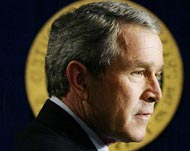
One particularly pro-Bush friend pointed to the dropping price as proof of George Bush’s cunning and strong leadership, but I saw through it, and told him that within three months the price for a barrel of oil would be over $70 again, but this time the oil companies’ profits wouldn’t be threatened.
To prove my conviction, I told my friend I wouldn’t post my plan to radically alter the United States’ consumption of gasoline until prices reached that point. But I did, and do, have a plan, a plan that if implemented would have real effects on the price of gasoline, our economy, the environment, and our relations with countries in the Middle East. That plan is finally posted here.
When the markets opened in Singapore this morning, oil
prices passed $73 a barrel, and I had won my bet (though I had hoped to lose it). Indeed, no one is calling for a tax on the billions of dollars in profits earned by Big 5 Oil in Q1 2006, and pumps on my street haven’t been under $3 in weeks. Big Oil gets richer, we get poorer, and this time people have grown to accept the changes. A serious feather in Bush’s cap, indeed.
Payback for Big Oil’s Getting Fat from our Paychecks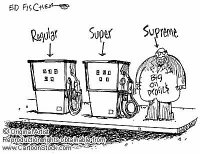
First off, let me say I do believe that, for reasons stated in my
first post on rising gas prices, I think that Big 5 Oil did make extraordinary profits from American citizenry in Q1 2006, and they probably did again in Q2, and some retribution is owed to the American public (though I feel the grievances were much less than most democrats, and even lesser than some republicans).
Let’s take a look at the White House’s proposal to give $100 to each driver in this country. There are
209+ million people over the age of 18 living in the United States today. Let’s say that 75%, or approximately 150 million have a drivers license. If the government decided to send each of these people $100 from Big Oil that would cost Big Oil $15 Billion, almost all of Big Oil’s combined $16 Billion in profits from Q1 2006.
Now if George Bush was earnest in his proposal, then there should be $15 Billion available for any program that could provide real relief from this crisis, right? However, as I said before, I think Big Oil’s culpability is lesser than most people, because the market was out of balance before this year, so I want only 20% of that money, or $3 Billion. Frankly, the oil companies are getting off pretty easy on the Nomadic plan.
The Nomadic Plan – a Real Solution
The Nomadic Plan (i.e. my plan) is a program designed to move 10 Million drivers to hybrid cars, or 20 Million drivers to diesel cars, over a short period of time. This would seriously reduce the amount of gasoline consumed by the American people, especially if the program could target owners of less efficient automobiles. The program would also serve to spur the economy, especially if incentives were included to buy American.
So how would the government accomplish this? In the Nomadic plan, the government would offer a series of incentives for trading in an automobile for the more fuel-efficient car. The first incentive would be $1,000 cash to any citizen or small business choosing to trade their car for a hybrid, or $500 to trade into a diesel. These incentives can be increased if trading in a truck or older gas guzzler.
The second incentive would be $1,000 to the dealership towards the trade-in value of the car they will receive. This means that even the oldest, worst car would have a trade-in value of $1,000. The final incentive would be $1,000 towards the finance companies to provide 0% financing with no down payment for people or companies taking advantage of the deal.
Would You Do It?
Would you trade your car in for a hybrid if you didn’t have to pay any money up front, got $1,000 cash back, and your trade-in was worth $1,000 more? Yes, you have payments to make on a new car, but with the increased price of gas, your payments will be largely offset by your savings at the pump. And the more gas your old car consumed, the more your payments will be offset by the program.
Consumer MarketsSmall businesses, presently struggling under the weight of increased gas prices, would see serious advantages to making this move. Whole fleets of trucks could be traded in on diesels, with old trucks having no previous value suddenly having a trade-in value and each new truck representing an influx of cash which can be used to improve the business.
Similar effects would be seen amongst people with older cars. These cars have minimal trade in value, so the trade-in incentive will represent a drastic increase in worth for the older cars. And since these cars tend to be very inefficient, drivers would see their payments offset almost completely by savings in gas. Meanwhile, the country benefits from removing these less efficient cars from the road.
Economic Effects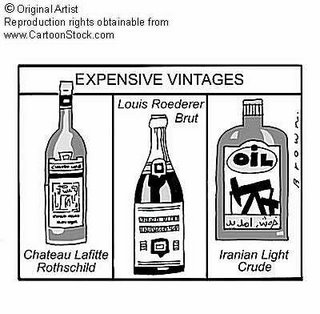
The United States
consumes 20 million barrels of oil each day, or 400 Million gallons of gas a year. As such, even a 5% decrease in the gasoline consumed in this country represents a whopping million barrels of oil that the US wouldn’t need if this program were successful. The decrease in demand would also convert to a decrease in price, as we witnessed in my
second post on gas prices in May.
If the program were successful, the decrease in gas prices would translate into a relative increase in purchasing power from the average paycheck. History shows us this money will circulate back into the economy as consumers make more purchases, and the economy will thrive. Additionally, the increase in small businesses illustrated earlier will mean more jobs, also invigorating the economy.
The struggling auto manufacturers in this country will benefit greatly from moving into the hybrid arena to meet increasing demand. Incentives to trade into American cars will further push American auto makers to create a line of cars that match our country’s growing need for fuel efficient automobiles.
Finally, if this program were implemented and were successful, it would probably be continued, as it will take some time to actually bring Big 5 Oil’s profits down to a consistently reasonable level. Implementing the Nomadic Plan once a year would see increased benefits as the country sees real improvements in its reliance on oil.
ConclusionThe Nomadic Plan offers a real program that could reduce our dependence on oil, and on the countries of the Middle East that we presently see as, predominantly, adversaries. It calls for Big 5 Oil to relinquish as percentage of their inflated profits, and for these funds to be utilized to convert consumers to gas-efficient automobiles.
The plan represents but one creative response to our present gas price crisis, leading to the question of why no creative plans have been offered up by our country’s leadership. Each day that we do nothing about the present situation, citizens and small businesses are effected by higher gas prices, our political standing with the Middle East grows worse, and the effects on the environment appear devastating.
The time has come for action of some sort, for a plan that starts to decrease our reliance on oil. This is one plan. Let’s hope that our government finds a plan and implements it sooner than later.
technorati tags: Oil, Gas, Price, Solution, Congress, White House, George Bush, Nomadic Plan, Small Business, Hybrid, Diesel
Roller Coaster by
Susan Marczak
Read more-->
Posted by Scottage at 4:28 AM /
| |




 Hey everybody! I am getting ready for another night of BE Radio, and looking for your input. Last week was a great week, with a lot of listeners and a ton of requests, but I know we can top it...can you help make it happen?
Hey everybody! I am getting ready for another night of BE Radio, and looking for your input. Last week was a great week, with a lot of listeners and a ton of requests, but I know we can top it...can you help make it happen? Also, we had two dedications last week and read three headlines off of peoples blogs. If you have a headline or a dedication you would like read over the air, tell me here...I'll get it on for you, no problem! Plus, if you would like to host a contest, driving some traffic to your site and getting people to read at least one post on your blog, let me know, we are always looking for contest hosts.
Also, we had two dedications last week and read three headlines off of peoples blogs. If you have a headline or a dedication you would like read over the air, tell me here...I'll get it on for you, no problem! Plus, if you would like to host a contest, driving some traffic to your site and getting people to read at least one post on your blog, let me know, we are always looking for contest hosts.

 I know, I’m slow today, I guess I’m the last person who will wind up posting on the military strike that killed Abu Musab al-Zarqawi. And originally, I was thinking I wouldn’t post on it at all, that everything that should be written would be written, and that there was no need to add an additional post to the nearly 8 Million posts on the killing.
I know, I’m slow today, I guess I’m the last person who will wind up posting on the military strike that killed Abu Musab al-Zarqawi. And originally, I was thinking I wouldn’t post on it at all, that everything that should be written would be written, and that there was no need to add an additional post to the nearly 8 Million posts on the killing. 

 I loved the Friedman piece. It chronicles his attendance of a high school graduation, and his surprise at the diversity of the graduating class. Friedman points to the US as still a beacon of hope for people all over the world, and the immigrants our society attracts as “our oil well – one that never runs dry”, indeed providing the US with its greatest resource: people.
I loved the Friedman piece. It chronicles his attendance of a high school graduation, and his surprise at the diversity of the graduating class. Friedman points to the US as still a beacon of hope for people all over the world, and the immigrants our society attracts as “our oil well – one that never runs dry”, indeed providing the US with its greatest resource: people. Maureen Dowd’s piece is much less optimistic, but equally important. Dowd looks at the various villains used by the Bush presidents, Sr. and Jr., to divert public attention from vital issues. And she points to Bush’s recent push for a ban on same-sex marriage as another example of this practice.
Maureen Dowd’s piece is much less optimistic, but equally important. Dowd looks at the various villains used by the Bush presidents, Sr. and Jr., to divert public attention from vital issues. And she points to Bush’s recent push for a ban on same-sex marriage as another example of this practice. 
 We are at a crossroads today, and the crossroads are always tumultuous. But if we make the right choices, and stay along the path, the road ahead seems amazing. Now we need to put in the hard and smart work to achieve it.
We are at a crossroads today, and the crossroads are always tumultuous. But if we make the right choices, and stay along the path, the road ahead seems amazing. Now we need to put in the hard and smart work to achieve it.
 For weeks now I’ve been hearing Republicans claim that Al Gore’s movie on global warming, An Inconvenient Truth, is nothing more than a ploy to propel him into the spot light, and make him the Democratic front runner for 2008. I never believed it, seeing how passionately he spoke on the growing crisis of global warming and the need for change now.
For weeks now I’ve been hearing Republicans claim that Al Gore’s movie on global warming, An Inconvenient Truth, is nothing more than a ploy to propel him into the spot light, and make him the Democratic front runner for 2008. I never believed it, seeing how passionately he spoke on the growing crisis of global warming and the need for change now.




 In the Sunday New York Times, columnist Frank Rich wrote a piece called Supporting Our Troops Over A Cliff, and if you haven’t read it yet, give it a shot, it’s well worth a read. In the Op Ed, Rich points out that while the Bush administration may not be carrying out a successful campaign in Iraq, they have shown true talent in their rhetoric campaign, and I agree with his sentiments while disagreeing with many of his points.
In the Sunday New York Times, columnist Frank Rich wrote a piece called Supporting Our Troops Over A Cliff, and if you haven’t read it yet, give it a shot, it’s well worth a read. In the Op Ed, Rich points out that while the Bush administration may not be carrying out a successful campaign in Iraq, they have shown true talent in their rhetoric campaign, and I agree with his sentiments while disagreeing with many of his points.

 One particularly pro-Bush friend pointed to the dropping price as proof of George Bush’s cunning and strong leadership, but I saw through it, and told him that within three months the price for a barrel of oil would be over $70 again, but this time the oil companies’ profits wouldn’t be threatened.
One particularly pro-Bush friend pointed to the dropping price as proof of George Bush’s cunning and strong leadership, but I saw through it, and told him that within three months the price for a barrel of oil would be over $70 again, but this time the oil companies’ profits wouldn’t be threatened.  First off, let me say I do believe that, for reasons stated in my first post on rising gas prices, I think that Big 5 Oil did make extraordinary profits from American citizenry in Q1 2006, and they probably did again in Q2, and some retribution is owed to the American public (though I feel the grievances were much less than most democrats, and even lesser than some republicans).
First off, let me say I do believe that, for reasons stated in my first post on rising gas prices, I think that Big 5 Oil did make extraordinary profits from American citizenry in Q1 2006, and they probably did again in Q2, and some retribution is owed to the American public (though I feel the grievances were much less than most democrats, and even lesser than some republicans). The Nomadic Plan (i.e. my plan) is a program designed to move 10 Million drivers to hybrid cars, or 20 Million drivers to diesel cars, over a short period of time. This would seriously reduce the amount of gasoline consumed by the American people, especially if the program could target owners of less efficient automobiles. The program would also serve to spur the economy, especially if incentives were included to buy American.
The Nomadic Plan (i.e. my plan) is a program designed to move 10 Million drivers to hybrid cars, or 20 Million drivers to diesel cars, over a short period of time. This would seriously reduce the amount of gasoline consumed by the American people, especially if the program could target owners of less efficient automobiles. The program would also serve to spur the economy, especially if incentives were included to buy American. Would you trade your car in for a hybrid if you didn’t have to pay any money up front, got $1,000 cash back, and your trade-in was worth $1,000 more? Yes, you have payments to make on a new car, but with the increased price of gas, your payments will be largely offset by your savings at the pump. And the more gas your old car consumed, the more your payments will be offset by the program.
Would you trade your car in for a hybrid if you didn’t have to pay any money up front, got $1,000 cash back, and your trade-in was worth $1,000 more? Yes, you have payments to make on a new car, but with the increased price of gas, your payments will be largely offset by your savings at the pump. And the more gas your old car consumed, the more your payments will be offset by the program.  The United States consumes 20 million barrels of oil each day, or 400 Million gallons of gas a year. As such, even a 5% decrease in the gasoline consumed in this country represents a whopping million barrels of oil that the US wouldn’t need if this program were successful. The decrease in demand would also convert to a decrease in price, as we witnessed in my second post on gas prices in May.
The United States consumes 20 million barrels of oil each day, or 400 Million gallons of gas a year. As such, even a 5% decrease in the gasoline consumed in this country represents a whopping million barrels of oil that the US wouldn’t need if this program were successful. The decrease in demand would also convert to a decrease in price, as we witnessed in my second post on gas prices in May.